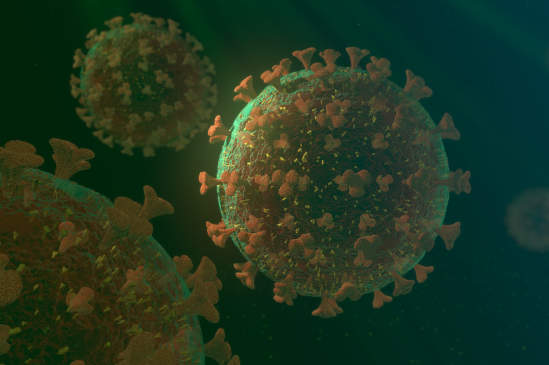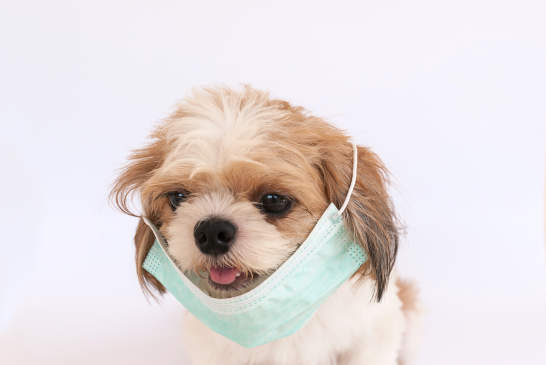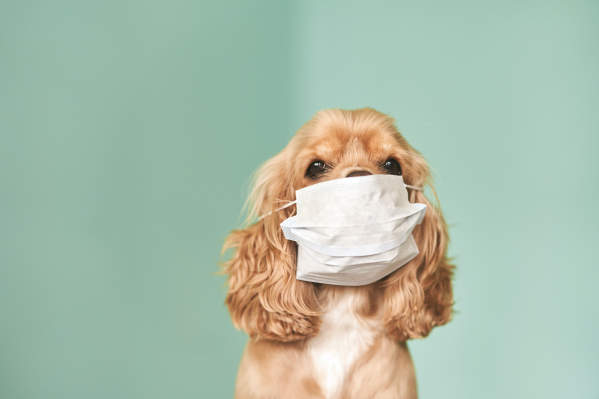Coronavirus has shook the world, bringing with it a sense of panic, and a fear of the unknown. Coronavirus, or COVID-19, is a viral respiratory illness, spread through droplets from coughs or sneezes or when someone touches their face after coming into contact with an infected surface. This, along with its quick transmission throughout the world, understandably, has alarmed a few people. Everyone is afraid of exposure and how sick they may get if they catch it - or what vulnerable members of their community they may pass the virus on to.
That fear, of course, extends to our pets, and with so little we actually know for sure, it's natural to worry. Especially when news broke on March 5 that there was a case of Coronavirus in a dog in Hong Kong. And while the diagnosis has been labeled "low-level" and a "weak positive," it has sparked another wave of worries for the population.
UPDATE: The first dog to test positive for COVID-19 has reportedly passed away as of March 16. Prior to being discharged from the hospital, the dog tested negative. There was no autopsy performed. We will continue to update as we learn more about the situation.
In response to these fears, the American Veterinary Medical Association recently put out a statement on their website, saying that “multiple international and domestic health organizations have indicated that pets and other domestic animals are not considered at risk for contracting or spreading COVID-19” and, according to the U.S. Centers for Disease Control and Prevention (CDC), no animals (as of publish time) in the United States have been identified with the virus, and there is no evidence that dogs or other pets can spread COVID-19.
Update: WHO has confirmed dogs and cats are safe from the virus in most cases, but regular hygienic precautions should be taken.
Phew. That’s great news, right? But, there’s of course a lot we don’t know. No dogs in America have been positive yet. But it’s not like we’re actively going around testing them, either.

The CDC suggests that any people who are sick with COVID-19 (or who think they might be) should isolate themselves from pets and other animals, just like they would with other people. For example, if you are sick, have another member of the family walk and feed the dog or cat, just to play it safe, and avoid snuggling with your pet (as hard as it is!) until the virus is gone. If you aren’t sure and think you might have it, wash your hands thoroughly before and after interacting with those animals.
The sad reality is, even though there have been no cases yet in America of pets with COVID-19, the potential human-animal interaction of the virus is not currently known. “Much as SARS was seen in cats in other countries, it is very possible that this virus can find other hosts,” says Dr. Dan Hochman DVM of Grove Street Veterinary in New Canaan, Connecticut.
In practical terms, we may want to think about the household pet in a quarantine situation. “If an individual is quarantined, it may be wise to view the cat or dog as having the potential to carry it to others in that home,” says Dr. Hochman.
Again we do not know if this will be the case, but we should be aware and cautious. “There is, as of now, only one case of a dog testing positive in Hong Kong and is quarantined with no signs,” says Dr. Hochman.
If You Think You Have Coronavirus
Anyone who has been exposed should monitor their pet(s) for illness as they are monitoring their own health. “If a person has been exposed to COVID-19 and their pet shows symptoms of illness, the pet should be isolated from other animals in the house and the owner should call their veterinarian or a veterinary emergency center,” says Dr. Jerry Klein, an emergency and critical care veterinarian, and Chief Veterinary Officer for the AKC. The owner should be sure to tell the veterinary facility of the potential or actual exposure. “Pets exposed to COVID-19 should not be taken to a veterinary clinic or veterinary hospital without first calling and explaining the situation. The clinic or hospital may want to utilize an isolation protocol in caring for the pet,” says Dr. Klein.
Also, while isolating, it’d be a good idea to keep them away from other pets, such as play groups, parks, or other animals in their pet family.

How To Protect Your Pet From Coronavirus
The number one way you can protect your furry friends is by keeping yourself safe from Coronavirus, and that means practicing good hygiene. “If you do contract the disease, then it is wise to ask someone else to care for your pets while you are sick and under quarantine. If you have no one to care for your pets, then avoid close contact – so no kissing and cuddling and definitely no sharing food, bowls, and utensils while under quarantine,” says Dr. Leigh Davidson BVSc, BApplSc of Your Vet Online.
Coronavirus Symptoms To Watch Out For In Your Pets
This is rather complicated. Since there are currently no cases of Coronavirus in pets in the United States, it is hard to say what the symptoms would be like compared to the symptoms in humans. The infected dog in Hong Kong is showing no symptoms at all. That said, “if you have an animal or pet that becomes sick after contact with people infected by COVID-19, it is important to contact your veterinarian, but remember it is highly unlikely that a dog or cat could be infected,” says Dr. Rachel Barrack, DVM, CVA, CVCH, and founder of concierge practice, Animal Acupuncture. In short, take the same precautions with your pet as you would yourself.
